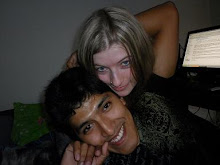Spanish...The last Spanish course I took ("Spanish Oral 1") I didn't get an A or an A+ because I refused to do the main project worth 15%. The reason why I enrolled in such a course was to be able to improve my spoken ability so that I am more easily able to speak in real life conversations. Maybe learning idioms and slang would be helpful, but even if they consider that to be "too much" for an intermediate learner, the idea of speaking aloud about conversational topics would be helpful to anyone. For the project, we couldn't be creative, and there precious few topics one could present on. They all had to do with world issues - "negative" topics in my opinion, like deforestation in a certain area, or global warming. I can't imagine myself having a good chat with a Hispanic person about these types of things. I got a B in the course.
Italian...In Italian I would have done extremely well. I hadn't missed one test in school my entire life for any reason until last year. My alarm didn't go off on a test day and I woke up at 10:30, 30 minutes into the test. Good thing I had been doing really well other than that. If I weren't a motivated student and didn't study hard that could very well have hurt my mark quite a bit, but my final mark was a B+.
French... B+...I didn't do horribly but French labs were terrible for me. I already lacked confidence in pronunciation but then I'm put in front of a computer to talk to it and it doesn't talk back or help you out. Instead the lab monitor goes around and stops to talk to people about what they're doing... egh, I just thought it was weird. It's the only language I'm not taking in fall. That's not to say I won't take it again in school, but I'm going to use Pimsleur to help me feel more confident in my pronunciation before going back to classes in uni.
--------
I finished "Italian The Easy Way". It really is good for supplemental study if you're in a beginner's course in school. I'd also recommend it for complete beginners, as I had started with the book long before I took my first Italian course and found everything to be so well explained that I had no trouble understanding and then doing the exercises. Not everyone agrees with me though, I found out while reading reviews for the book on amazon.

There are plenty of exercises with an answer key in the back, a good English-Italian and Italian-English glossary. A wide variety of subjects, grammatical points, and vocabulary are covered, there are dots under letters to show where a stress is in pronouncing a word if the word is irregular as far as pronunciation, there are a variety of types of exercises (fill-in-the-blank, word search, crossword puzzles, being creative and making your own little stories which are the only exercises that there are no answers for). There are end-of-chapter reviews, and 3 "vocabulary checkpoints" with a list of vocabulary you should memorize before moving on, most of which you'll already have memorized just by being exposed to it already. I made flashcards for the ones I didn't know.
But...answer key has 1 answer only for each exercise when some things can be written/said in more than 1 way. The other minor thing is that a few times I've come across errors in the answer key or the answers in the answer key don't match up.
It was probably worth almost an entire year's worth of Italian in university though. Some people warned not to take it "as a substitute for a textbook" but I think this book (and a lot of other books, such as ones from the Practice Makes Perfect series) are waaaay more useful! Since starting university I haven't come across a language textbook yet that is better than one of those. And the even crazier thing is that you could buy the entire selection of Spanish (or French or Italian) PMP books for less than what one university textbook costs.
